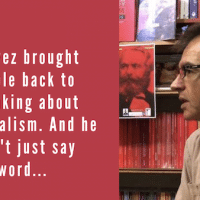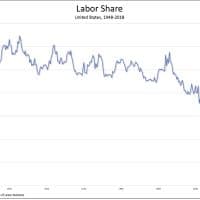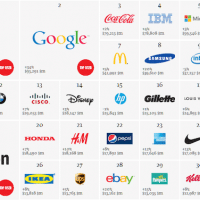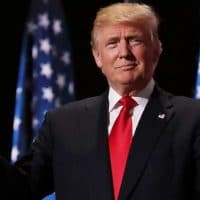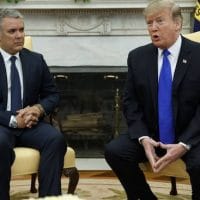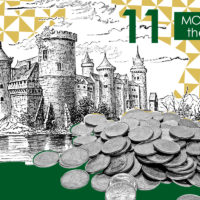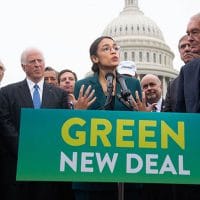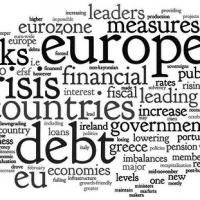-
The worldwide struggle against fascism: a conversation with Nestor Kohan (Part 2)
An important Latin American political theorist argues that right-wing “internationalism” requires a leftist response that also reaches beyond national boundaries.
-
Joao Pedro Stédile: “Venezuela is extremely important because it is the battle of this century”
It is a fundamental task for the class struggle that we succeed in liberating Lula so that he becomes the principal spokesman, he is the one who has the capacity to help mobilize the masses against the system and the project of the extreme right.
-
Promises, promises
They keep promising, ever since the recovery from the Great Recession started more than eight years ago, that the share of national income going to American workers will finally begin to increase. But it’s not.
-
‘United we will rise’
Not to be dramatic, but it’s probably the best thing we’ve ever read.
-
Capitalist globalization is not unwinding: TNCs continue to increase their power and profits
The Great Recession of 2008 marked the end of a lengthy period of international economic growth and rapidly increasing international trade. Now, some ten years later, economic activity, including trade and foreign direct investment, remains far below pre-crisis levels with little sign of revival.
-
How the U.S. is strangling Haiti as it attempts regime change in Venezuela
Last week, the people of Haiti erupted in protests over fuel price hikes. Behind the protests lie a story of corruption by the elite, blatantly insensitive IMF policies, predatory pricing by U.S. oil firms and the fallout of the economic war on Venezuela.
-
The Trump tax plan proves a bonanza for business
In sum, thanks to the Trump tax plan, trillions of dollars that could have been used to transform our transportation and energy infrastructure, industrial structure, and system of social services are instead being transferred to big businesses, who use them for speculative activities and to further enrich their already wealthy managers and stock holders.
-
Guaido ‘appoints’ new oil executives as Trump vows ‘all options on table’
Trump has repeatedly refused to rule out a military option.
-
The State and Accumulation Under Contemporary Capitalism
Historically, capitalism develops institutions and ideologies that justify surplus extraction and capital accumulation. In the last decades of the twentieth century, the financialization of capitalism initiated a new era of accumulation which is known in academic contexts as finance-capital-driven neoliberalism.
-
Sweezy on the Rise of Fascism
Both Sweezy and Dimitrov agree that fascism arises in the middle class and becomes a threat when the bourgeoisie embraces it, but Sweezy’s unique contribution is to demonstrate fascism’s relationship to the postwar transitional period of class equilibrium.
-
Financial blockade: Chronology of a strategy to destroy Venezuela
Sanctions against Venezuela are real and palpable mechanisms of destruction of the State, identity and, with it, of Venezuelan society.
-
‘The neoliberal project is alive but has lost its legitimacy’: David Harvey
In an interview with The Wire, the well-known Marxist scholar talks about the surge of populist and right-wing politics and the future of neoliberalism, capitalism and technology.
-
Myth of the Medieval Jewish Moneylender with Julie Mell
On this episode, Scott Ferguson and Maxximilian Seijo speak with Mell about these and other connections that may be drawn between her own and neochartalism’s critical projects.
-
Why the rich are to blame for climate crisis
Some people, some companies, some decision makers in particular, have known exactly what priceless values they have been sacrificing to continue making unimaginable amounts of money. And I think many of you here today belong to that group of people.
-
Executive summary: The economic consequences of the boycott of Venezuela
The international financial blockade imposed by the United States against Venezuela has caused the South American country to lose 350,000 million dollars in production of goods and services between 2013 and 2017, according to the research carried out by the Economic Debates Unit of the Latin American Geopolitics Strategic Center (CELAG).
-
A Green New Deal is the first step toward an eco-revolution
In this interview, Foster discusses why a Green New Deal is just an entry point to an ecological revolution, and why any economic-social system that hopes to address the climate crisis must transcend capitalism.
-
Two decades of labour flexibilisation in Mexico has left workers facing “drastic” precarity
rtemis is now 60 years old and started working when she was a teenager. She has been in formal employment for 38 years, with a few brief interruptions, and is still working. Her salary is not as good as it used to be: she no longer receives basic benefits such as medical care, and her chances of retiring are zero, due to the peculiarities of Mexico’s legislation.
-
Socialism and exploitation
If you listened to or read the text of President Trump’s State of the Union speech Tuesday night, you might have been surprised by the explicit mention of socialism.
-
Russia denounces U.S. cynicism sanctioning Venezuelan PDVSA
Russia denounced Tuesday the U.S. cynicism by announcing sanctions against the Venezuelan oil company PDVSA and excluding from that sanction U.S. companies operating in the South American nation.
-
The challenges for the European left regarding debt and the banks
The policy of Quantitative Easing (QE) has been implemented by the ECB since 2015 in the wake of what the Fed had done in the U.S. from 2008 to 2014. It consists of massively purchasing private and public debt securities from banks in the Eurozone and from corporations.

